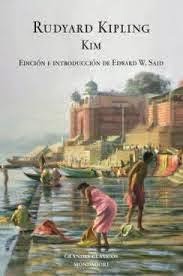A contemporary novel can be set in a society that is known to the author whereas a futuristic novel cannot. This means that the contemporary novel can embody a kind of verisimilitude that it is difficult or impossible to reproduce in the futuristic novel.
"All hours of the twenty-four are alike to Orientals..."
-Rudyard Kipling, Kim (London, 2010), p. 26.
"The escort, their heads tied up native fashion, fell in on either side of the cart, shuffling enormous clouds of dust." (p. 76)
"...every tale was told in the even, passionless voice of the native-born..." (p. 127)
"A very few white people, but many Asiatics, can throw themselves into a mazement as it were by repeating their own names over and over again to themselves, letting the mind go free upon speculation as to what is called personal identity." (p. 190)
"Even to-day, tickets and ticket-clipping are dark oppression to Indian rustics. They do not understand why, when they have paid for a magic piece of paper, strangers should punch great pieces out of the charm. So, long and furious are the debates between travellers and Eurasian ticket-collectors." (p. 202)
"...native police mean extortion to the native all India over." (p. 212)
Kim is full of Kipling's acute observations of the people of India. Obviously, Poul Anderson was not able to observe the colonists on Imhotep or Daedalus in just this way. Paradoxically, fictional verisimilitude might be more evident when, having fully realized another rational species like the Ythrians, Anderson introduces a new member of that species, a new unique individual who nevertheless behaves authentically as an Ythrian and not like an impossibly winged human being. We know how Ythrians live and die because Poul Anderson has told us in previous stories and, of course, there is no one to contradict him!

1 comment:
Hi, Paul!
All these notes about Kipling's novel KIM has gotten me interested in rereading that book, after I finish rereading Poul Anderson's GENESIS. I am still surprised by how many parallels THE GAME OF EMPIRE has with KIM. No surprise, of course, since that was deliberately intended by PA.
All the same, since KIM was, at least in part, meant for younger readers, I hope you go on to some of the stories Kipling set in India with older readers in mind. Such as PLAIN TALES FROM THE HILLS.
Sean
Post a Comment